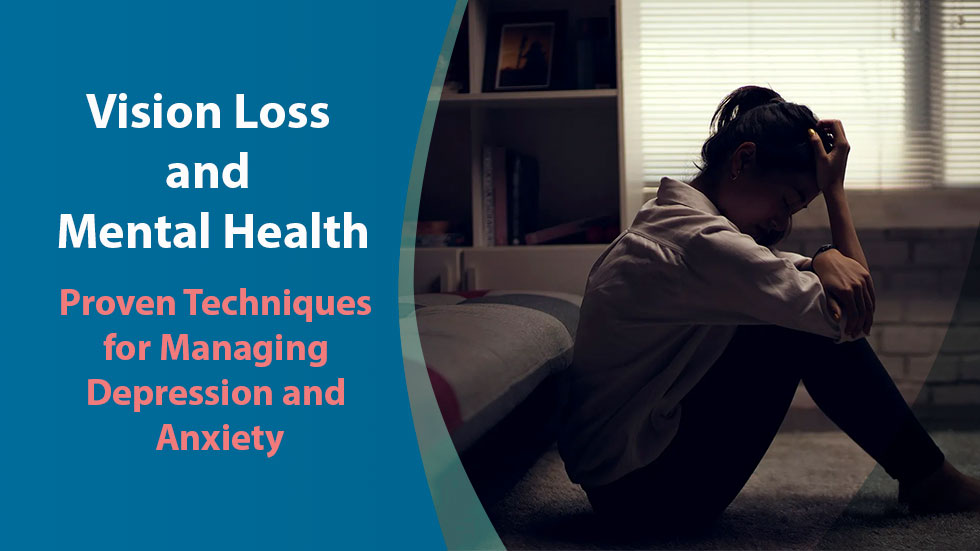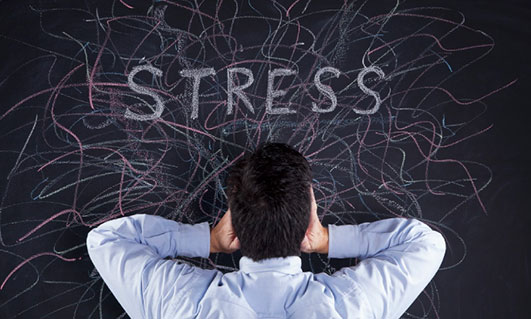
Experiencing vision loss can be one of the most challenging events in a person’s life. It affects not only the ability to see but also one’s sense of independence, self-esteem, and overall mental health. Feelings of depression and anxiety can often accompany vision impairment, making it crucial for individuals to develop effective coping strategies. In this blog, we’ll explore practical approaches to manage these emotions and promote mental well-being after vision loss.
Understanding Depression and Anxiety
Before diving into coping strategies, it’s important to understand what depression and anxiety might look like in the context of vision loss:
- Depression may manifest as persistent sadness, feelings of hopelessness, loss of interest in activities, fatigue, and difficulty concentrating.
- Anxiety can present as excessive worry, restlessness, irritability, and physical symptoms like increased heart rate or difficulty sleeping.
Both conditions can stem from the emotional challenges associated with adapting to vision loss, such as feeling isolated, frustrated, or uncertain about the future. Recognizing these feelings is the first step toward finding effective coping mechanisms.
Practical Coping Strategies
1. Seek Professional Support
Professional help can be invaluable when managing depression and anxiety. A mental health professional, such as a therapist or counselor, can provide personalized strategies and support tailored to your unique situation. Cognitive Behavioral Therapy (CBT) is particularly effective in addressing negative thought patterns and developing coping skills.
2. Connect with Support Groups
Joining a support group can help you connect with others who understand what you’re going through. Sharing experiences, challenges, and successes can foster a sense of community and reduce feelings of isolation. Many organizations focus on vision loss and offer both in-person and online support groups.
3. Practice Mindfulness and Relaxation Techniques
Mindfulness practices, such as meditation, deep breathing exercises, or progressive muscle relaxation, can help reduce anxiety and improve emotional well-being. These techniques promote present-moment awareness, allowing you to manage racing thoughts and emotional distress more effectively. Regular practice can lead to a calmer mind and better stress management.
4. Establish a Routine
Creating a daily routine can provide structure and stability, which can be particularly helpful when adjusting to vision loss. Incorporate activities you enjoy and prioritize self-care, including physical exercise, social interactions, and hobbies. Routines help build a sense of normalcy and control, which can be beneficial in managing anxiety and depressive symptoms.
5. Focus on Physical Health
Physical health has a direct impact on mental health. Regular physical activity, a balanced diet, and adequate sleep are essential components of emotional well-being. Engaging in activities like walking, yoga, or swimming can boost mood and reduce stress levels. Consider consulting with a healthcare provider to create a wellness plan that suits your needs.
6. Utilize Assistive Technologies
Embracing assistive technologies can enhance independence and reduce feelings of frustration associated with vision loss. Tools like screen readers, Braille displays, or voice-activated devices can make daily tasks more manageable, allowing for greater engagement in life. Learning how to use these technologies can also foster a sense of accomplishment and improve overall confidence.
7. Set Realistic Goals
Setting achievable goals can help create a sense of purpose and motivation. Start with small, manageable objectives and gradually work toward larger ones. Celebrate your progress, no matter how small, to boost self-esteem and combat negative feelings. Having clear goals can provide direction and a sense of accomplishment.
8. Reach Out for Help
Don’t hesitate to ask for support from friends, family, or community resources. Open communication about your feelings and needs can foster understanding and encouragement. Whether you need assistance with daily tasks or someone to talk to, reaching out can ease the burden and improve your emotional state.
Conclusion
Managing depression and anxiety after vision loss is a journey that requires patience and resilience. By implementing these practical coping strategies, individuals can navigate the emotional challenges associated with vision impairment and work toward improved mental well-being. Remember, seeking help is a sign of strength, and you are not alone on this journey. Embracing support and taking proactive steps can lead to a fulfilling life despite the challenges of vision loss.





